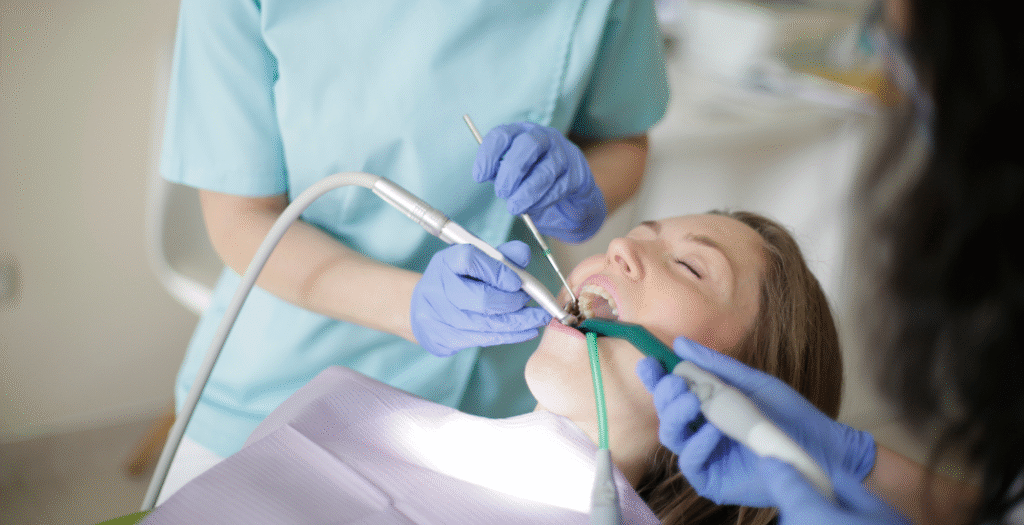Maintaining a healthy smile is about more than brushing and flossing. While these daily habits are essential, there’s another key factor that often gets overlooked—regular dental cleanings. Visiting your dentist in Mira Road for routine cleanings is one of the best methods for maintaining healthy teeth and gums. It’s not just about making your smile look good; it’s about keeping your mouth healthy and preventing serious issues down the line.
Many people don’t realize that plaque and tartar buildup, which can’t always be removed by brushing alone, are the main culprits behind tooth decay and gum disease. That’s where professional cleanings come in. By getting regular cleanings, your dentist can remove the hardened plaque, check for early signs of potential problems, and ensure that your teeth stay bright and healthy.
In this blog, we’ll explore why regular dental cleanings are so important, the benefits they offer, and how they are essential to your general health and oral wellness. Whether you love visits to the dentist or have been putting them off, this post will give you all the reasons why it’s time to make those cleanings a priority.
What Are Regular Dental Cleanings?
A professional dental cleaning removes plaque and tartar buildup from teeth that cannot be eliminated through regular brushing and flossing. Your dentist or hygienist will perform the cleaning procedure, which typically involves scaling, polishing, and fluoride treatment. This procedure is much more thorough than at-home care, as it reaches areas that regular brushing may miss.
Difference Between Routine and Deep Cleanings
Routine dental cleanings are part of preventive care and are generally recommended every six months for most individuals. They focus on removing plaque and tartar and maintaining healthy teeth and gums.
Deep cleanings, on the other hand, are typically recommended for individuals who have been diagnosed with gum disease. Deep cleanings target the areas below the gum line and help treat gum infections.
Benefits of Regular Dental Cleanings
Dental cleanings do more than remove plaque and tartar—they offer a range of health benefits that are essential for maintaining both oral and overall well-being. Here are the key benefits of regular dental cleanings:
Prevention of Gum Disease
Gum disease, or periodontal disease, is one of the most common consequences of poor oral hygiene. When plaque is not adequately removed from the teeth, it hardens into tartar. Tartar can irritate the gums, leading to gingivitis, an early stage of gum disease that includes bleeding, redness, and inflammation. If gingivitis is not treated, it can progress into periodontitis, a more severe form of gum disease that affects the bones supporting the teeth, leading to tooth loss.
Regular dental cleanings are essential in preventing gum disease. The dentist or hygienist removes plaque and tartar from the teeth during the cleaning, especially in places that brushing and flossing might miss. This helps keep your gums healthy and reduces the risk of developing gum disease.
Early intervention through cleanings can prevent the condition from worsening and reduce the need for more extensive procedures, including surgery or scaling and root planing.
Cavity Prevention
Cavities form when plaque, which is a sticky layer of bacteria, accumulates on the teeth. Over time, plaque erodes the enamel on your teeth by feeding on the carbohydrates and acids in your mouth. This leads to tooth decay and the formation of cavities. If cavities are left untreated, they can result in tooth sensitivity, pain, and even the need for fillings, root canals, or tooth extractions.

Regular dental cleanings help remove tartar and plaque before they damage teeth. Professional cleanings also help eliminate buildup in hard-to-reach areas, where plaque can easily accumulate and lead to cavities.
Keeping teeth clean and free from plaque is one of the most effective ways to preserve their integrity and maintain their health.
Fresh Breath
Bad breath, also known as halitosis, is often caused by bacteria in the mouth that thrive in plaque and tartar. These bacteria produce foul-smelling compounds that result in persistent bad breath. Additionally, food particles trapped between the teeth and on the tongue can also contribute to unpleasant odors in the mouth.
Regular dental cleanings remove bacteria, plaque, and tartar that can cause bad breath, leading to fresher breath and a healthier mouth overall. The removal of plaque buildup around the gums and on the teeth helps reduce the chances of developing bad breath.
If you’re concerned about bad breath, scheduling a professional cleaning can help you combat the bacteria responsible and improve your oral hygiene.
Brighter Smile
One of the most noticeable benefits of professional dental cleaning is the cosmetic improvement it provides. Over time, plaque and tartar buildup can cause teeth to yellow, which may affect your appearance and confidence. Stains from foods and drinks such as coffee, tea, and red wine can also contribute to discoloration.
During a dental cleaning, your dentist or hygienist will remove surface stains from your teeth, restoring their natural color and brightness. The result is often a noticeable improvement in the whiteness of your smile, which can enhance your overall appearance and boost your self-esteem. While cleanings are not a substitute for professional teeth whitening treatments, they can help maintain a healthy, bright smile by removing the daily buildup of stains.
Early Detection of Oral Health Issues
One of the most significant advantages of regular dental cleanings is the ability to detect potential oral health problems early. During a cleaning, your dentist will thoroughly examine your teeth, gums, and mouth for any indications of issues, including gum disease, cavities, oral cancer, or other difficulties related to oral health. Early detection of these issues allows for quicker treatment and often less invasive procedures.
For example, spotting a small cavity during a cleaning means the dentist can address it before it becomes a larger problem, potentially preventing root canal treatment or tooth extraction. Similarly, detecting early signs of gum disease can help prevent more serious stages of the condition, reducing the need for costly treatments down the line.
Additionally, professional cleanings provide an opportunity to discuss any concerns you might have with your dentist.
Whether it’s about oral hygiene habits, tooth sensitivity, or cosmetic concerns, cleanings are an excellent time to consult with your dentist on how to improve your overall oral health.
Connection Between Oral Health and Overall Health
While it’s well known that oral health impacts our teeth and gums, it’s less recognized how it affects the rest of our body. Studies have shown that poor oral health is linked to a variety of severe health conditions, including heart disease, stroke, and diabetes.
Gum disease, for example, has been shown to increase the risk of cardiovascular diseases. The bacteria in the mouth can enter the bloodstream and contribute to the inflammation of blood vessels, which can lead to heart problems.
Additionally, individuals with diabetes are more susceptible to gum disease, and regular dental cleanings can help mitigate this risk by keeping their oral health in check.
Recommended Frequency of Dental Cleanings
The American Dental Association (ADA) recommends that individuals visit their dentist at least once every six months for a routine cleaning. However, certain factors may require more frequent visits. For instance, people who smoke, have diabetes, or are prone to gum disease may need cleanings more often.
Your dentist can decide on the ideal timetable for you based on your oral health and risk factors.
Risks of Neglecting Regular Cleanings
Neglecting regular dental cleanings can lead to a variety of oral health issues. Here are some of the risks of skipping cleanings:
- Gum Disease: Plaque buildup can lead to gingivitis, and if left untreated, it can progress to periodontitis, eventually causing tooth loss.
- Tooth Decay: Without professional cleanings, plaque and tartar accumulate, leading to cavities. Over time, untreated cavities can result in root infections, requiring root canals or tooth extractions.
- Bad Breath: Poor oral hygiene can lead to persistent bad breath. The bacteria that cause bad breath thrive in a mouth full of plaque and tartar, which regular cleanings help to remove, leading to fresher breath.
- Higher Treatment Costs: Skipping cleanings often results in the need for more expensive treatments, such as fillings, root canals, or tooth extractions. Regular cleanings can save you money by preventing these costly procedures.
Comparison of Oral Health Conditions
| Condition | Caused by | Consequences if Untreated | Preventive Measure |
| Gingivitis | Plaque accumulation | Gum inflammation, bleeding | Regular dental cleanings |
| Periodontitis | Untreated gingivitis | Tooth mobility, bone loss | Timely professional treatment |
| Cavities | Plaque and tartar buildup | Tooth decay, potential tooth loss | Consistent oral hygiene |
| Bad Breath (Halitosis) | Bacteria in the mouth | Social discomfort, self-esteem issues | Regular cleanings and hygiene |
FAQs
How often should I get a dental cleaning?
It’s recommended that you get a professional dental cleaning every six months. However, based on their dentist’s advice, individuals with specific health conditions, such as gum disease or diabetes, may require more frequent visits.
Is professional teeth cleaning painful?
While professional teeth cleaning is generally not painful, some individuals with sensitive teeth or gums may experience mild discomfort. If you feel sensitivity, inform your dentist so they can adjust the cleaning procedure for comfort.
Can I remove tartar at home?
Tartar can only be removed by a dental professional. While brushing and flossing can prevent plaque buildup, once plaque hardens into tartar, it requires specialized tools and techniques that only a dentist or hygienist can provide.
Will dental cleanings whiten my teeth?
Dental cleanings can remove surface stains caused by food, beverages, and smoking, leading to a naturally brighter smile. However, for deeper whitening, professional teeth whitening treatments are recommended alongside regular cleanings for optimal results.
Does insurance cover dental cleanings?
Many dental insurance plans cover routine cleanings as part of preventive care. It’s best to check with your insurance provider to understand what’s included in your specific plan and if there are any restrictions on frequency.

Conclusion
Regular dental cleanings are essential for maintaining oral health and overall well-being. They play a vital role in your health routine by preventing gum disease, cavities, and bad breath and ensuring a brighter smile. They also help detect potential problems early and reduce the risk of more severe conditions.
If you haven’t had dental cleaning recently, now is the time to schedule an appointment. At Family Dental Clinic in Mira Road, we provide expert care with a patient-first approach, ensuring you maintain optimal oral health. Don’t wait for problems to develop—take action today and keep your smile healthy for years to come.






